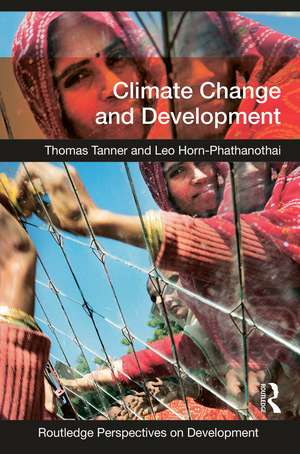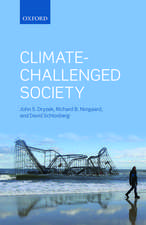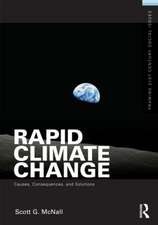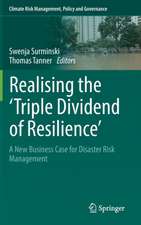Climate Change and Development: Routledge Perspectives on Development
Autor Thomas Tanner, Leo Horn-Phathanothaien Limba Engleză Paperback – 20 dec 2013
Climate Change and Development provides a comprehensive and multi-disciplinary foundation for understanding the complex and tangled relationship between development and climate change. It argues that transformational approaches are required in order to reconcile poverty reduction and climate protection and secure sustained prosperity in the twenty first century. Section One provides the building blocks for understanding climate science and the nexus between climate and development. Section Two outlines responses to climate change from the perspective of developing countries, with chapters on international agreements, climate change mitigation and adaptation, and climate finance. Each chapter offers analytical tools for evaluating responses, enabling readers to ask smart questions about the climate change and development nexus as policy and action evolve in the coming years. The last three chapters of the book, contained in Section Three, are forward looking and focus on why and how development must be re-framed to deliver more equitable and sustainable outcomes. This section sets out different critiques of ‘development-as-usual’ and explores alternative paradigms of development in a warming and resource-constrained world.
This is an invaluable and clearly written text that uses real world examples to bring to life perspectives from across different disciplines. It also contains chapter learning outcomes, and end of chapter summaries, discussion questions, and suggestions for further reading and relevant websites. The text is suitable for both undergraduate and postgraduate students, as well as those working in international development contexts who wish to get to grips with this pressing global challenge.
| Toate formatele și edițiile | Preț | Express |
|---|---|---|
| Paperback (1) | 342.57 lei 3-5 săpt. | +26.35 lei 6-12 zile |
| Taylor & Francis – 20 dec 2013 | 342.57 lei 3-5 săpt. | +26.35 lei 6-12 zile |
| Hardback (1) | 1118.67 lei 6-8 săpt. | |
| Taylor & Francis – 8 ian 2014 | 1118.67 lei 6-8 săpt. |
Din seria Routledge Perspectives on Development
-
 Preț: 290.35 lei
Preț: 290.35 lei -
 Preț: 280.57 lei
Preț: 280.57 lei -
 Preț: 310.65 lei
Preț: 310.65 lei -
 Preț: 281.76 lei
Preț: 281.76 lei -
 Preț: 311.18 lei
Preț: 311.18 lei -
 Preț: 412.08 lei
Preț: 412.08 lei -
 Preț: 260.63 lei
Preț: 260.63 lei -
 Preț: 291.52 lei
Preț: 291.52 lei -
 Preț: 373.71 lei
Preț: 373.71 lei -
 Preț: 296.21 lei
Preț: 296.21 lei -
 Preț: 355.31 lei
Preț: 355.31 lei - 18%
 Preț: 1000.27 lei
Preț: 1000.27 lei -
 Preț: 402.29 lei
Preț: 402.29 lei - 18%
 Preț: 1219.65 lei
Preț: 1219.65 lei -
 Preț: 491.26 lei
Preț: 491.26 lei -
 Preț: 394.78 lei
Preț: 394.78 lei -
 Preț: 500.84 lei
Preț: 500.84 lei - 15%
 Preț: 483.41 lei
Preț: 483.41 lei -
 Preț: 467.44 lei
Preț: 467.44 lei -
 Preț: 428.25 lei
Preț: 428.25 lei - 25%
 Preț: 880.18 lei
Preț: 880.18 lei -
 Preț: 393.46 lei
Preț: 393.46 lei -
 Preț: 427.80 lei
Preț: 427.80 lei -
 Preț: 373.00 lei
Preț: 373.00 lei -
 Preț: 439.58 lei
Preț: 439.58 lei - 20%
 Preț: 1112.10 lei
Preț: 1112.10 lei -
 Preț: 475.11 lei
Preț: 475.11 lei - 18%
 Preț: 1115.21 lei
Preț: 1115.21 lei -
 Preț: 357.25 lei
Preț: 357.25 lei
Preț: 342.57 lei
Nou
Puncte Express: 514
Preț estimativ în valută:
65.55€ • 68.63$ • 54.37£
65.55€ • 68.63$ • 54.37£
Carte disponibilă
Livrare economică 20 martie-03 aprilie
Livrare express 05-11 martie pentru 36.34 lei
Preluare comenzi: 021 569.72.76
Specificații
ISBN-13: 9780415664271
ISBN-10: 0415664276
Pagini: 392
Ilustrații: 60 black & white illustrations, 13 black & white tables, 14 black & white halftones, 46 black & white line drawings
Dimensiuni: 156 x 234 x 22 mm
Greutate: 0.55 kg
Ediția:New.
Editura: Taylor & Francis
Colecția Routledge
Seria Routledge Perspectives on Development
Locul publicării:Oxford, United Kingdom
ISBN-10: 0415664276
Pagini: 392
Ilustrații: 60 black & white illustrations, 13 black & white tables, 14 black & white halftones, 46 black & white line drawings
Dimensiuni: 156 x 234 x 22 mm
Greutate: 0.55 kg
Ediția:New.
Editura: Taylor & Francis
Colecția Routledge
Seria Routledge Perspectives on Development
Locul publicării:Oxford, United Kingdom
Public țintă
Postgraduate and UndergraduateCuprins
Introduction Chapter 1. Science, Drivers and Impacts of Climate Change Chapter 2. The Climate Development Nexus Chapter 3. The International Climate Change Regime Chapter 4. Mitigation Responses and Low-emissions Development Chapter 5. Adaptation Responses and Building Climate Resilient Development Chapter 6. Climate Finance: Moving from Development Cooperation to Climate Cooperation Chapter 7. Development and Climate Action in a Changing World Chapter 8. Alternative Development Futures: Pathways to Climate-smart Development Chapter 9: Conclusion: This Make-or-break Decade
Recenzii
"This book is therefore a very useful summary of current debates about climate change and development, based on an initial framing of the problem in terms of global greenhouse gas concentrations." – Progress in Development Studies, Tim Forsyth, London School of Economics and Political Science, UK
Descriere
This text provides a comprehensive and multi-disciplinary entry level account of the challenges, the responses, and the alternative pathways to tackling development in a changing climate. The first section provides the building blocks for understanding and framing the climate-development nexus. It includes an overview of the science, drivers and impacts of climate change, and present the different disciplinary perspectives. The second section presents and assesses responses to the development challenges posed by a changing climate at different spatial scales. It addresses international, regional, national, sub-national and non-governmental responses to climate change. It also includes an overview of the main instruments and competing approaches for addressing climate change as a development concern, including market-based measures, regulatory instruments, and voluntary agreements. The final section is solutions-oriented and sets out different critiques of ‘development-as-usual’ and competing visions of development in a warming and carbon-constrained world. A description of the changing context of development, shaped by the interlocking challenges of poverty, energy, growing natural resource scarcities, deteriorating ecosystems and climate change helps to situate the debate about alternative modes of development. This section lays out the intellectual and scientific underpinnings of the Green Economy, and presents it as an alternative to GDP-centric conceptions of development, one that is consistent with climate change adaptation and mitigation whilst also contributing to social justice and poverty reduction.
Climate Change and Development brings together insights and perspectives from across natural and social science disciplines. Focusing in particular on concerns and perspectives of poor countries and poor people, its hallmark is its concern with structural considerations at the heart of the climate-development nexus. It argues that a transformational – rather than incremental – approach to tackling climate change challenges offers the best route to reducing poverty, stabilising the climate and securing the future well-being of all.
Climate Change and Development brings together insights and perspectives from across natural and social science disciplines. Focusing in particular on concerns and perspectives of poor countries and poor people, its hallmark is its concern with structural considerations at the heart of the climate-development nexus. It argues that a transformational – rather than incremental – approach to tackling climate change challenges offers the best route to reducing poverty, stabilising the climate and securing the future well-being of all.


















